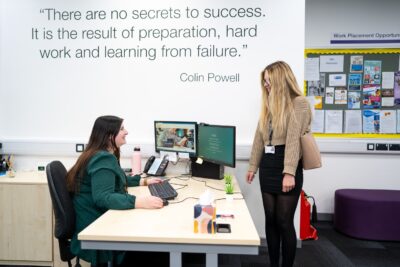The College recognise that personal and social development is at the heart of all learning for the person to develop to be their most successful self.
CAREERS AND ADVICE

Chesterfield College seeks to maximise the life chances of all its students and apprentices, and with reference to young people aged 16-18 to prepare them for life beyond college as they successfully transition into adulthood.
Our careers team are here to help you all the way through college. We can offer support from before you even apply, right the way through college and even after you leave us. Whether it’s progressing onto the next level of study, starting work or heading to university, we’re here to help guide you.
The team provide one-to-one appointments and also deliver sessions on all things careers and employment across all areas of Chesterfield College, so you will get to know all members of the team during your time with us.

Students and Apprentices Service Hub
In our Student and Apprentice Services Hub you can access specialist advice and support to help you with decisions about your future career path. You can also access virtual support from our dedicated careers team if required, please contact our team via [email protected] to arrange an appointment. Towards the bottom of this page, you will also find an array of online resources you can access to help you explore the different options and career paths available.
In the Student and Apprentice Services Hub you can also find out more about the financial support available to you.

CEIAG Objectives
Through the Careers Education Programme the College demonstrates its commitment to meaningful CEIAG objectives which are aligned to the Good Career Guidance Benchmarks for young people in colleges (informed by the Gatsby Benchmarks) and which ensures that the College:
• Provides a stable careers programme.
• Uses learning from career and labour market information.
• Addresses the needs of each student.
• Links curriculum learning to careers.
• Provides opportunities for encounters with employers and employees.
• Provides experience of workplaces.
• Provides opportunities for encounters with further and higher education.
• Provides personal guidance.

Chesterfield College believes that good CEIAG connects learning to the future, to the needs of employers, and is aligned to industry growth. It should motivate people by giving them a clearer idea of the routes to jobs and careers that they will find engaging and rewarding. Good CEIAG widens peoples’ horizons, challenges stereotypes, and raises aspirations. It provides them with the knowledge and skills necessary to make successful transition to the next stage of their lives. This supports social mobility by improving opportunities for all, especially those from disadvantaged backgrounds and those with Special Educational Needs and Disabilities (SEND).
The College is committed to working effectively and collaboratively with all relevant partners, including employers, schools, other providers, parents/carers, alumni, and Local Authorities, to maximise opportunities for all and reduce the risk of young people becoming NEET (not in employment, education, or training).
Resources
National Careers Service https://nationalcareers.service.gov.uk/
Prospects www.prospects.ac.uk
iCould https://icould.com/
Career Pilot https://www.careerpilot.org.uk/
Discover Uni https://discoveruni.gov.uk/
Skills for Careers Young People | Skills for Careers (education.gov.uk)
UCAS www.ucas.com
Student Finance https://www.gov.uk/student-finance
Apprenticeships www.apprenticeships.gov.uk/
Not Going to Uni https://www.notgoingtouni.co.uk/
How to write a CV – LifeSkills CV Builder – https://barclayslifeskills.com/i-want-help-applying-for-jobs/school/cv-builder/
More support services
Support for parents/guardians
The Careers Service at Chesterfield College is available to provide 1-1 guidance and support to all students and apprentices during their studies. We are here to guide them into developing, discovering and maintaining their career aspirations.
CV Writing
Whether you are leaving college to pursue your dream career or if you want a part-time job alongside your studies, it is essential that you have a great CV. Our careers team can help you with CV writing to give you the edge when applying for jobs or apprenticeships.
UCAS Application Advice
To apply for university you must submit a UCAS application form and a personal statement. This is then assessed by university admissions staff, who will be in touch to either provide you with an offer or reject your application.
Provider Access Statement
This statement sets out the college’s arrangements for managing the access of providers to students and apprentices at the college for the purpose of giving them information about the provider’s education or training offer. This complies with the requirement for all young people in year 12/13 provision to have access to opportunities to enable them to plan their own personal progression routes, in line with the legal obligations set out under Section 42B of the Education Act 1997. Statement can be downloaded from the bottom of this page.
